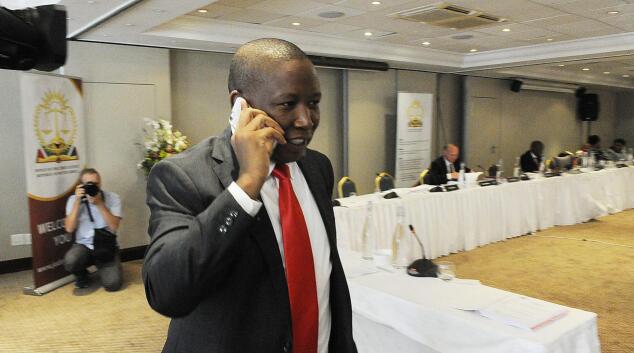EFF leader Julius Malema argues that Parliament sought to sanction him for fulfilling his role as an opposition MP designated by the National Assembly to serve as a Commissioner on the JSC.
EFF leader Julius Malema has launched an urgent court bid to stop Parliament from adopting a report that forces him to apologise for allegedly using the Judicial Service Commission (JSC) “for his personal interests”.
This comes after he asked a judge about a R500,000 defamation order he made against his party during a judgeship interview last year.
In 2019, Judge Elias Matojane ordered the EFF to pay former finance minister Trevor Manuel half a million rand in damages after the EFF claimed nepotism in the appointment of SA Revenue Services commissioner, Edward Kieswetter.
Then in 2021, when Judge Matojane applied for a position at the Appeals Court, Malema – a JSC commissioner – questioned Judge Matojane’s judgment during his interview.
Parliament’s Joint Committee on Ethics and Members’ Interests then found Malema should not have used the JSC as a “platform for his personal interests” and recommended that he apologise to Judge Matojane and the JSC.
The committee found that Malema had “engaged in a matter that concerned him and his political party directly. The matter was before a court of law”.
It recommended that its report be adopted by the National Assembly for the sanction to take effect.
Now, Malema wants the Western Cape High Court to suspend the implementation of the committee’s report, pending his application to review it and set it aside.
In his affidavit attached to his urgent application, Malema argues that certain individuals and organisations, who disagreed with his line of questioning, sought to censure him for his conduct.
These individuals could not do so before the JSC because it was common cause that the JSC itself decided to take no action against him for “these seemingly improper questions”, he said.
“That organisation then resorted to abusing extraneous processes (relevant to Parliament) to achieve this end: my censure as a JSC Commissioner.
“The report, published by Parliament, is a manifestation of this abuse of process. My only remedy against this abuse of process is to review and set aside the report. But that will be pointless if the report is implemented before I am able to do so,” he said.
Further in his affidavit in support of an urgent application for an interim interdict, Malema’s states that since Parliament refused to suspend the implementation of the report, he was forced to launch a court application or his “rights would be severely and unjustly prejudiced since I would be bound by the findings of that report, which findings I believe are erroneous”.
He added that the possible sanction also included his suspension from Parliament for up to a month, including being deprived of his salary.
“Faced with this invidious choice, and in further consequence of Parliament’s refusal to compromise with me, I am forced to come to court to seek its protection pending the review,” he said.
He told the court that Parliament sought to sanction him for fulfilling his role as an opposition MP designated by the National Assembly to serve as a Commissioner on the JSC.
“The report suggests that my conduct while acting as a Commissioner of the JSC, was improper and amounted to a breach of my duties in that capacity. This, too, is untrue.
“In other words, Parliament seeks to punish me in terms of its code for my conduct before another body in another capacity, and in circumstances where that body itself did not find my conduct to be objectionable or in breach of its rules and procedures,” he said.
While he took no issue with being held accountable, he said, he took issue with certain individuals and organisations who largely target him “for my conduct at the JSC because they deem his behaviour unacceptable”.
“I do not wish to speculate as to why my behaviour is deemed unacceptable but, I am willing to hazard a guess that they do so because my participation on the JSC makes it more difficult in certain circumstances for their favoured candidates to be appointed.
“These individuals and organisations, upset with my being a JSC Commissioner, then resort to baseless claims to have me censured by Parliament.
“It will not be earth-shattering to the court to know that what these individuals and organisations actually do is weaponise the Parliamentary disciplinary processes – all of which are under the control of the ruling ANC, the political opposition of my party – to discipline me,” he said.
He further highlighted that it was no surprise that the ANC’s numerical strength meant disciplinary outcomes were largely a foregone conclusion and opposition MPs would be subjected to punitive punishment, regardless of the merits of each case.
“And therein lies the problem: complaints are made against the likes of me by individuals and organisations who prefer certain candidates over others, and these people ask the ANC, my political opposition, and an organisation that also prefers certain candidates over others, to discipline me.
“This is the same ANC that seeks to use constitutional structures to ensure its favoured judges get appointed at the dictates of the ANC’s ‘deployment committee’, which effectively acts as a shadow government,” he said.
Malema maintained that if Parliament forged ahead and implemented the report then it would ultimately, not only undermine the constitutional role to be played by the opposition, but it would undermine the independence of the judiciary itself. That, he says, would be the “death-knell for constitutionalism as we know it”.
Political Bureau








